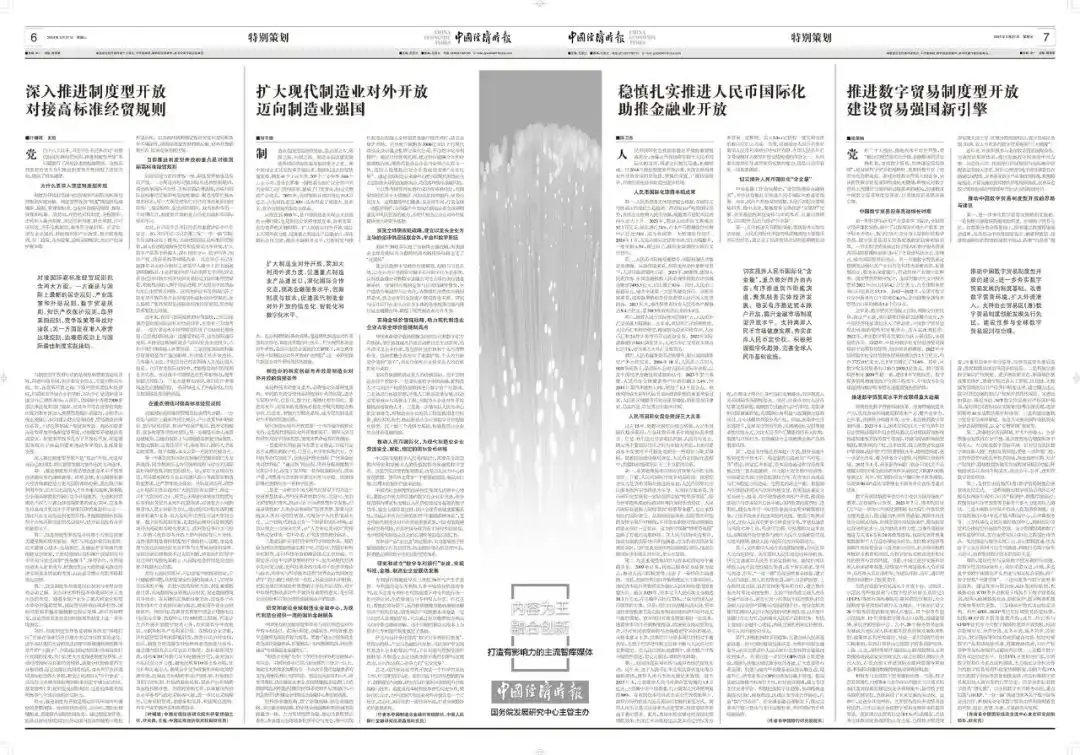Suggestions on four paths to promote institutional opening up in China's digital trade
Suggestions on promoting institutional opening up of China's digital trade:Further consolidate the institutional foundation for the development of digital trade. Improve the digital business environment and expand access to foreign investment. Support the innovative development of the digital trade system in the free trade zone (Hong Kong) and try first. Constructive participation in global digital trade rules and governance.

Zhang Monan, Deputy Director and Researcher of the US-European Research Department of the China Center for International Economic Exchanges
** **
■ Zhang Monan
The 20th National Congress of the Communist Party of China proposed that to promote high-level opening up to the outside world, we must "promote the optimization and upgrading of trade in goods, innovate the development mechanism of trade in services, develop digital trade, and accelerate the construction of a trading power", raising the strategic and importance of developing digital trade to unprecedented new heights. Faced with competition among major digital trading countries in the world, we should seize the critical period of the formation of digital trade rules, actively respond to the challenges brought by the game among major digital trading countries and new issues of rules, accelerate the institutional opening up of China's digital trade, and create a new engine for building a trading power.
01
China's digital trade ushers in a period of rapid growth
A new round of scientific and technological revolution and industrial transformation are advancing by leaps and bounds. The global digital economy is booming, giving birth to digital trade with data as the key production factor, digital services as the core, and digital ordering and delivery as the main features. Digital trade is a new trend in the development of international trade. and new engine. On the one hand, digital trade has brought disruptive innovations in various fields through digital technology and digital services, spawning a large number of new trade formats and models, and becoming a new highlight in international trade. On the other hand, digital trade strengthens the sharing of information and technological elements among various industries through data flow, promotes the deep integration of manufacturing and service industries, and drives the digital transformation of traditional industries. According to statistics from the World Trade Organization, global exports of digitally deliverable service trade will reach US$4.1 trillion in 2022, accounting for 57.1% of global service trade exports. 2012-2022 In 2001, global exports of digitally deliverable services grew at an average annual rate of 6.1%, which was 1.6 percentage points higher than the average annual growth rate of global service trade exports during the same period.
In recent years, digital trade has relied on its advantages in online ordering and online delivery to accelerate the integration and optimization of industrial chains, supply chains and value chains, injecting new momentum into China's economic recovery and growth. China's digital trade has shown strong resilience and development vitality., entering a period of rapid growth. In 2022, China's digital trade development strength will leap to a new level, achieving both quantitative and qualitative improvements. In 2022, the scale of China's digitally deliverable service trade will be higher than the growth rate of goods trade and services trade in the same period. In 2022, the scale of China's digitally deliverable service trade will reach 2.5 trillion yuan, or approximately US$372.70 billion, an increase of 78.6% from five years ago. Among them, the export value of digitally deliverable services was US$210.53 billion. The digital trade surplus has doubled compared with 2020, achieving a surplus for five consecutive years. The growth rate of digital services trade is much higher than the global average, and China has become the fastest economy in digital services trade globally.
02
Significant progress has been made in promoting high-level opening up of digital trade
Continue to optimize the reform of the digital business environment. The business environment is productivity, and optimizing the business environment is liberating productivity and improving competitiveness. In recent years, China has strived to build an open, fair and non-discriminatory digital business environment. In June 2023, the State Council issued the "Several Measures on Pilot Alignment with International High Standards and Promoting Institutional Opening-up in Conditional Pilot Free Trade Zones and Free Trade Ports", which is aligned with international high-standard economic and trade rules and focuses on intellectual property rights, competition policies, and online In areas such as consumer rights protection, we will improve the level of digital trade facilitation, increase transparency, further deepen reforms, and strive to create a fair, transparent and predictable business environment. In January 2022, the Ministry of Commerce and other six departments jointly issued the "Guiding Opinions on High-Quality Implementation of the Regional Comprehensive Economic Partnership Agreement (RCEP)", which specifically proposed high-level implementation of e-commerce rules and cooperation with more RCEP member states. Carry out key tasks such as practical cooperation in e-commerce.
The reform of the digital business environment is also conducive to attracting global high-end production factors and attracting foreign investment with high quality. In July 2023, the State Council issued the "Opinions on Further Optimizing the Foreign Investment Environment and Increasing Efforts to Attract Foreign Investment", proposing to improve the quality of foreign investment utilization, ensure national treatment for foreign-invested enterprises, continue to strengthen foreign investment protection, improve the level of investment operation facilitation, and Increase fiscal and tax support and improve foreign investment promotion methods and 24 policy measures in 6 aspects, including efficient outbound security assessments of important data and personal information. Support foreign-invested enterprises in digital economy and other fields to carry out vocational education and training with various vocational colleges and vocational training institutions to create a more optimized investment and business environment for the development of digital trade. At present, China has gradually implemented the negative list system for market access, and has successively issued negative lists for foreign investment access, negative lists for market access, etc., providing policy support for building an open, fair and transparent business environment.
Accelerate the creation of a high-level open platform for digital trade. Pilot areas, demonstration areas, etc. actively explore regulatory rules compatible with international high-standard agreements such as the Digital Economy Partnership Agreement (DEPA), and conduct stress tests in advance for national institutional opening up. China has established 28 pilot areas for innovative development of service trade, 37 service outsourcing demonstration cities, and 12 national digital service export bases to build a wide-ranging and multi-level innovation platform. Among them, 28 pilot areas for innovative development of service trade have deeply explored the institutional mechanisms, policy systems and open paths for innovative development of service trade, forming a series of innovative experiences and practical cases, effectively leading and driving the innovative development of national digital trade. Shanghai, Beijing, Shenzhen and other places have carried out pilot projects for international Internet data interaction and cross-border data flow security management, established regional international business entry and exit bureaus, opened dedicated international Internet data channels in key parks, and actively explored and constructed new mechanisms for cross-border data flow management.
Actively participate in the governance of global digital trade rules. At present, the game and competition among major powers in the field of digital trade are concentrating from scientific and technological strength to the field of competition for technical standards and international rule-making rights. Winning the right to formulate digital trade rules will also win the initiative in future development. In recent years, due to the impact of counter-globalization, the multilateral trade process of the World Trade Organization has been blocked, and it has been unable to meet the rule needs brought about by the development of global digital trade. Regional free trade agreements (RTAs) are growing rapidly and have become the dominant force in global digital trade rules. Global digital trade rules present new characteristics of major-country dominance and regional segmentation, gradually forming digital trade rules represented by the United States, Europe, and Asia-Pacific."Three major templates".
In recent years, China has actively participated in international cooperation in global digital trade, improved the international rule system, and proposed China's plan to develop digital trade. However, overall, there is still a big gap between China's current economic and trade rules and high-standard economic and trade rules. At the same time, the e-commerce provisions that have been concluded aim to reduce border barriers and do not involve non-discriminatory treatment of digital products, cross-border data flow, and location of computing facilities. Rules such as source code still have a weak say in the multi-bilateral digital trade rules negotiation game.
03
Ideas and suggestions on promoting institutional opening up of China's digital trade
First, further consolidate the institutional foundation for the development of digital trade. 一是构建完善跨境数据流动制度。加强数字贸易立法。在数据分类分级基础上,探索建立数据跨境流动清单,优先推动不危及国家安全、敏感程度低、经济效益明显的数据跨境有序流动,探索“白名单”制度,注重事前事中事后监督,改事前监管为事后监管,强化数据出境后风险评估监管。二是积极完善数字知识产权制度。逐步增强新业态、新领域创新成果的保护,需要尽快完善人工智能、区块链、大数据等领域的知识产权保护制度设计,建立健全适应数字时代发展的知识产权保护的具体规则。完善比如算法、商业方法、NFT数字作品知识产权保护规则,及时修订《著作权法实施条例》等法律法规,逐步明晰对AI生成物的保护标准等。三是构建完善数字贸易安全保障制度。如重点完善中国外商投资安全审查管理制度,以及“长臂管辖”制度等。
Second, improve the digital business environment and expand access to foreign investment. 分步骤推动互联网有序开放,逐步放宽电信增值服务市场准入。大力优化数字营商环境。针对目前中国数字市场准入的门槛较高的问题,要进一步降低门槛,支持外资参与优先开放的领域,推动政府采购、知识产权保护、跨境数据传输等领域的国际规则对接,降低跨国公司双向合规成本,营造公平、公开、透明的数字营商环境。
Third, support the innovative development of the digital trading system in the free trade zone (Hong Kong) and try first. 一是积极推动数字贸易示范区在对接高标准国际规则、知识产权保护、数据跨境流动、数据评级与分类监管等方面进行更大力度的压力测试。二是实施数字市场外资准入负面清单制度。在自由贸易区(港)率先开放大数据中心、云计算服务等。三是探索设立国际离岸数据中心,按照国际协定和法律规定引进境外数据。设立物理隔离的数字特殊监管区域,在自由贸易区(港)设立数据出海节点。优先推进与境外实现工业、商业数据直通,优先给予工业互联网可信专用通道,积极打造数字贸易示范区,培育发展数字贸易的良好生态。
Fourth, constructively participate in global digital trade rules and governance. 在数字贸易国际谈判上,我应采取双边、区域、多边及中美欧平衡路径齐头并进与相互配合策略,推广数字贸易“中国方案”。一是深度参与数字贸易多边谈判。建设性参与联合国、G20等国际机制,积极推动在WTO等多边框架下增加若干数字贸易规则,如纳入跨境数据流动、隐私保护、数字服务和技术壁垒等相关条款。二是推动开放式诸边协定谈判。利用APEC、RCEP等已有区域贸易协定框架,加快RCEP数字贸易条款升级;此外,将以参与CPTPP谈判作为我数字领域制度型开放契机,推动在数据交互、分类分级、业务互通、服务共享、监管互认、数字确权等领域的规则融合对接,加快对接数字产品非歧视性待遇、数据跨境流动、知识产权保护等高标准规则议题谈判步伐。三是提升数字贸易双边协定水平。中国FTA正在加速扩容,应将数字贸易作为重点谈判领域,大力推动以合作为导向的数字贸易规则和政策协调框架,加快升级FTA谈判的数字贸易条款及制度安排,将高标准数字贸易规则纳入新商签的自贸协定。四是全面拓展数字贸易“朋友圈”。以中国数字大市场为依托,重点加强与RCEP、“一带一路”共建国家等关于数字贸易交流合作,积极推动全球数字贸易治理规则朝着更加开放、包容、普惠、平衡、共赢的方向发展。
(The author is deputy director and researcher of the US-European Research Department of the China Center for International Economic Exchanges)

** **
